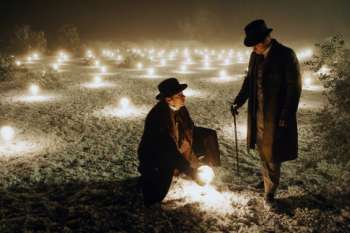Woody Allen has spent his filmmaking career portraying a series of confidence-challenged, bumbling New York Jews in troubled romantic relationships. We look at these films and think that’s simply the type of man Woody is.
 So what are we to make of Christopher Nolan? Three of the four big-budget Hollywood films he’s made portray haunted men obsessed by the murder of their loved ones who devote (and thereby ruin) their lives attempting to exact vengeance. I’m talking about Memento, Batman Begins, and now, The Prestige. (As for his other big-budget thriller, Insomnia, and his two smaller debut films, I haven’t seen them.)
So what are we to make of Christopher Nolan? Three of the four big-budget Hollywood films he’s made portray haunted men obsessed by the murder of their loved ones who devote (and thereby ruin) their lives attempting to exact vengeance. I’m talking about Memento, Batman Begins, and now, The Prestige. (As for his other big-budget thriller, Insomnia, and his two smaller debut films, I haven’t seen them.)
If Nolan continues to mine this vein with such rich results as he does in The Prestige, he just might become our foremost cinematic chronicler of obsession. But then again… wasn’t everyone saying something very similar about another filmmaker who recycles tricks like a skipping record, M. Night Shyamalan?
The Prestige, based on the novel of the same name by Christopher Priest, details the rivalry between two turn-of-the-century stage magicians, Robert Angier (an appropriately theatric Hugh Jackman) and Alfred Borden (the magnificent Christian Bale). The rivalry turns deadly when an onstage accident leads to the drowning death of Angier’s wife Julia. From then on, the double-dealing and the backstabbing grows increasingly frantic as each seeks to one-up the other. There are twists within tricks within mysteries — some that you might not figure out until after you’ve left the theater entirely.
Central to the competition is an act of Borden’s that he calls simply The Teleported Man, wherein Borden appears to zap himself instantaneously across the stage. Angier devotes his energy, his fortune, and his time to discovering the secret of the Teleported Man. The quest leads him across the ocean to track down eccentric inventor Nikola Tesla (a nearly unrecognizable David Bowie). Tesla just might have invented the device that makes Borden’s trick possible — or perhaps it’s just another level of the game.
Christopher Nolan and co-screenwriter brother Jonathan Nolan have a love for Gothic, puzzle-box narrative structures. Memento cleverly simulated the mental state of a man with no short-term memory by narrating the events of the film backwards. Batman Begins, though relatively straightforward in structure, gave us a maze of villains and counter-villains for the Dark Knight to sort through. True to form, The Prestige gives us a flashback within a flashback — and then shows no hesitancy to yank us back to one of the two frame stories with no warning.
But without the tortured souls at his films’ centers, Nolan’s works would be nothing more than clever contraptions (cf. Shyamalan). And it’s the tormented protagonists at the heart of these three films that drive them. It’s the tortured soul that keeps you coming back for second, third, and fourth viewings.
The condition of Memento‘s (anti?-)hero is divine retribution for his callous disregard of an insurance claimant. His continuing quest to revenge his wife’s murder has become a farce, a tool which others can use for their own dastardly ends. Batman‘s Bruce Wayne is similarly doomed to scour the earth for a satisfaction he will never get — and the girl who should be his by cinematic fiat is one who, in the end, he must reject. As for The Prestige‘s Angier, he’s given a career, a fortune, and even a new love in the form of luscious Scarlett Johansson. But he’s constitutionally unable to just take these blessings and run. Instead he remains obsessed with turning back the clock, a sleight of hand that not even the greatest illusionist can pull off.
Do yourself a favor: see The Prestige. Watch it carefully and take notes. You’re going to want to refer back to them after you buy the DVD for the second, third, and fourth viewings.
As for Christopher Nolan, let’s hope he’s got more up his sleeve in the future. The man’s simply too talented to let waste a career.